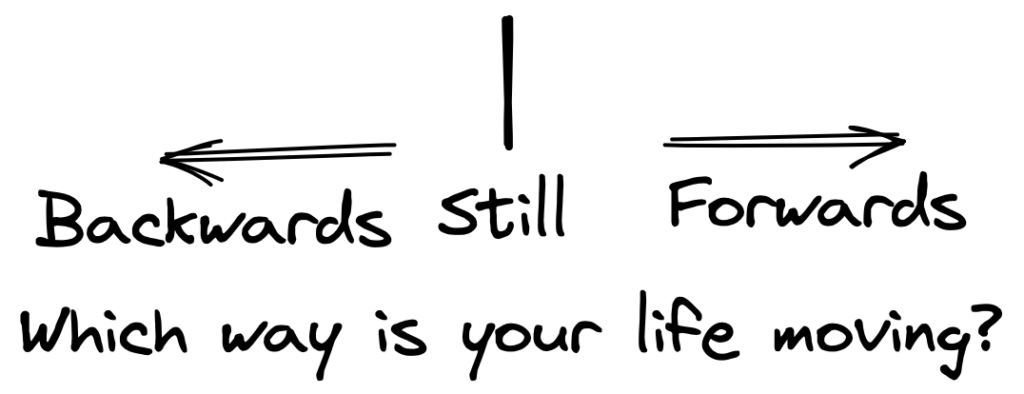Arrival Fallacies, PhDs, and Goal Management
Tennis games move quickly. The starting stance for tennis is about being light on your feet and ready to move in any direction that your opponent sends the ball. In high school, my tennis partner and I would practice together. She was a great tennis player. We would often fall prey to a “good shot confidence” mistake. When I made a good hit, I would get too proud of myself, admire the shot, and forget to return to my base position. When you play against good players like my tennis partner, your good shots are often returned to you. You best get prepared for the next shot. This is all to say that we shouldn’t celebrate too much before we win the game. No one shot will make or break your match. We have to be ready (and ideally, excited) for the next one that may come.
“When we think that we need to get to a certain checkpoint to feel “complete,” “accomplished,” or “done,” we’re making an arrival fallacy.”
This residual focus on a good shot in tennis is similar to an arrival fallacy. When we think that we need to get a certain checkpoint to feel “complete,” “accomplished,” or “done,” we’re making an arrival fallacy. (1)
Arrival fallacies crept into my graduate school experience
Does graduate school ever get easier?
As a graduate student, I constantly thought that things would get easier after completing the next milestone. I started this thought pattern with my coursework. I imagined that if I could just get through my year of statistics courses, I would cruise through graduate school. Then, my expectation continuously shifted to finishing my Master’s thesis, writing the meta-analysis for my preliminary exams, and finally, defending my doctoral thesis.
My friend and I would have the same conversations during each of these stages. We thought that our schedules would free up a little after we finished our core coursework. We imagined that academic research would feel less stressful once we became PhD candidates (after defending our PhD proposals). Unsurprisingly, shortly after we completed one stage, we were hoping to get to the next — to finish again.
“Perfection is an unrealistic goal. Arrival is an illusion.”
Instead of focusing on finishing again, I am learning to conceptualize each goal as a blank slate or a new beginning. For example, each blog article is a new chance to communicate interesting ideas about sleep, focused thought, or the interplay between the two. Podcaster, Brittany Luse, featured on Therapy for Black Girls, mentions that no one podcast episode will make or break a show. Sometimes creators just just have to put something out. Similarly, there is no single blog article that will make writing easier for me or that will define The Research Life. blog. No single research paper will define my academic career. For any area of life, perfection is an unrealistic goal. Arrival is an illusion.
Some practical tips to avoid arrival fallacies
Arrival fallacies have crept in my life from my high school tennis games to defending my PhD dissertation in graduate school. Now that I acknowledge and understand arrival fallacies, I’m slowly learning to avoid them. Here are a few tips that I use.

- Change your perception of large scale goals to themes.
Instead of setting a strict goal like sleeping well every night, I set a theme to prioritize my sleep health. This might look like using my bed only for sleeping, setting a reasonable bedtime that I can consistently stick to, and actively working to lower my stress levels (e.g., running, walking, setting boundaries for my time). (2) - Regularly set small goals in alignment with larger themes.
One method for goal setting on a smaller scale is to use a weekly list of a few intentions. I explain my system for weekly planning in a previous post here . - Measure your small goals as incremental progress instead of using a binary, “complete” or “incomplete” metric.
For example, I have recently transitioned out of using a failure or success system to evaluate my days. Now, I assess my days based on if I made reasonable progress, was I stagnant and moved nowhere, or did I “lose” time somehow and have to redo a task that I thought had already been done. Put differently, I ask myself if I moved the needle; is there forward movement toward my goals or intentions (→)? Am I just getting through the days but not doing any meaningful work ( | )? Or, am I making consistent errors that put me behind (←)?
I no longer anticipate that there will be some perfect period in my life. I have not “arrived” nor do I believe in any magical arrival. Instead, I am focusing on continuous progress, forward movement, and enjoying this life in the best way that I know how.
If you found value in this post and want to say thanks, here are a few ways to support the blog:
- Leave a comment for further discussion.
- Chat with me directly and send feedback, questions, or article requests to emily.c.hokett@gmail.com
- Join Medium and my email list for regular posts (~2x per month, never spam, no ads).
- Buy me a tea🍵 to support the maintenance of the blog.
Notes
- I developed overarching idea for this blog article from the Focused podcast, “You Never Arrive.”
- The Cortex podcast introduced me to the idea of yearly themes.